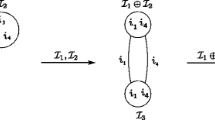Abstract
Due to the remarkable power of modern SAT solvers, one can efficiently solve NP-complete problems in many practical settings by encoding them into SAT. However, many important problems in various areas of computer science lie beyond NP, and thus we cannot hope for polynomial-time encodings into SAT. Recent research proposed the use of fixed-parameter tractable (fpt) reductions to provide efficient SAT encodings for these harder problems. The parameterized complexity classes ∃ k ∀ * and ∀ k ∃ * provide strong theoretical evidence that certain parameterized problems are not fpt-reducible to SAT. Originally, these complexity classes were defined via weighted satisfiability problems for quantified Boolean formulas, extending the general idea for the canonical problems for the Weft Hierarchy.
In this paper, we provide alternative characterizations of ∃ k ∀ * and ∀ k ∃ * in terms of first-order logic model checking problems and problems involving alternating Turing machines with appropriate time bounds and bounds on the number of alternations. We also identify parameterized Halting Problems for alternating Turing machines that are complete for these classes.
The alternative characterizations provide evidence for the robustness of the new complexity classes and extend the toolbox for establishing membership results. As an illustration, we consider various parameterizations of the 3-coloring extension problem.
Access this chapter
Tax calculation will be finalised at checkout
Purchases are for personal use only
Preview
Unable to display preview. Download preview PDF.
Similar content being viewed by others
References
Ajtai, M., Fagin, R., Stockmeyer, L.J.: The closure of monadic NP. J. of Computer and System Sciences 60(3), 660–716 (2000)
Arora, S., Barak, B.: Computational Complexity – A Modern Approach. Cambridge University Press (2009)
Biere, A., Heule, M., van Maaren, H., Walsh, T. (eds.): Handbook of Satisfiability. Frontiers in Artificial Intelligence and Applications, vol. 185. IOS Press (2009)
Cesati, M.: The Turing way to parameterized complexity. J. of Computer and System Sciences 67, 654–685 (2003)
Chen, Y., Flum, J.: A parameterized halting problem. In: Bodlaender, H.L., Downey, R., Fomin, F.V., Marx, D. (eds.) Fellows Festschrift 2012. LNCS, vol. 7370, pp. 364–397. Springer, Heidelberg (2012)
Downey, R.G., Fellows, M.R.: Parameterized Complexity. Monographs in Computer Science. Springer, New York (1999)
Downey, R.G., Fellows, M.R.: Fundamentals of Parameterized Complexity. Texts in Computer Science. Springer (2013)
Endriss, U., de Haan, R., Szeider, S.: Parameterized complexity results for agenda safety in judgment aggregation. In: Proceedings of the 5th International Workshop on Computational Social Choice (COMSOC 2014). Carnegie Mellon University (2014)
Fichte, J.K., Szeider, S.: Backdoors to normality for disjunctive logic programs. In: Proceedings of the Twenty-Seventh AAAI Conference on Artificial Intelligence (AAAI 2013), pp. 320–327. AAAI Press (2013)
Flum, J., Grohe, M.: Describing parameterized complexity classes. Information and Computation 187(2), 291–319 (2003)
Flum, J., Grohe, M.: Parameterized Complexity Theory. An EATCS Series, vol. XIV. Springer, Berlin (2006)
Gomes, C.P., Kautz, H., Sabharwal, A., Selman, G.: Satisfiability solvers. In Handbook of Knowledge Representation. Foundations of Artificial Intelligence, vol. 3, pp. 89–134. Elsevier (2008)
de Haan, R., Szeider, S.: Fixed-parameter tractable reductions to SAT. In: Sinz, C., Egly, U. (eds.) SAT 2014. LNCS, vol. 8561, pp. 85–102. Springer, Heidelberg (2014)
De Haan, R., Szeider, S.: The parameterized complexity of reasoning problems beyond NP. In: Baral, C., De Giacomo, G., Eiter, T. (eds.) Principles of Knowledge Representation and Reasoning: Proceedings of the Fourteenth International Conference, KR 2014, Vienna, Austria, July 20-24. AAAI Press (2014)
De Haan, R., Szeider, S.: The parameterized complexity of reasoning problems beyond NP. Technical Report 1312.1672v3, arXiv.org (2014)
Hopcroft, J.E., Motwani, R., Ullman, J.D.: Introduction to Automata Theory, Languages, and Computation, 2nd edn. Addison-Wesley Series in Computer Science. Addison-Wesley-Longman (2001)
Malik, S., Zhang, L.: Boolean satisfiability from theoretical hardness to practical success. Communications of the ACM 52(8), 76–82 (2009)
Meyer, A.R., Stockmeyer, L.J.: The equivalence problem for regular expressions with squaring requires exponential space. In: SWAT, pp. 125–129. IEEE Computer Soc. (1972)
Niedermeier, R.: Invitation to Fixed-Parameter Algorithms. Oxford Lecture Series in Mathematics and its Applications. Oxford University Press, Oxford (2006)
Papadimitriou, C.H.: Computational Complexity. Addison-Wesley (1994)
Pfandler, A., Rümmele, S., Szeider, S.: Backdoors to abduction. In: Rossi, F. (ed.) Proceedings of the 23rd International Joint Conference on Artificial Intelligence, IJCAI 2013. AAAI Press/IJCAI (2013)
Sakallah, K.A., Marques-Silva, J.: Anatomy and empirical evaluation of modern SAT solvers. Bulletin of the European Association for Theoretical Computer Science 103, 96–121 (2011)
Stockmeyer, L.J.: The polynomial-time hierarchy. Theoretical Computer Science 3(1), 1–22 (1976)
Wrathall, C.: Complete sets and the polynomial-time hierarchy. Theoretical Computer Science 3(1), 23–33 (1976)
Author information
Authors and Affiliations
Editor information
Editors and Affiliations
Rights and permissions
Copyright information
© 2015 Springer-Verlag Berlin Heidelberg
About this paper
Cite this paper
de Haan, R., Szeider, S. (2015). Machine Characterizations for Parameterized Complexity Classes Beyond Para-NP. In: Italiano, G.F., Margaria-Steffen, T., Pokorný, J., Quisquater, JJ., Wattenhofer, R. (eds) SOFSEM 2015: Theory and Practice of Computer Science. SOFSEM 2015. Lecture Notes in Computer Science, vol 8939. Springer, Berlin, Heidelberg. https://doi.org/10.1007/978-3-662-46078-8_18
Download citation
DOI: https://doi.org/10.1007/978-3-662-46078-8_18
Publisher Name: Springer, Berlin, Heidelberg
Print ISBN: 978-3-662-46077-1
Online ISBN: 978-3-662-46078-8
eBook Packages: Computer ScienceComputer Science (R0)




